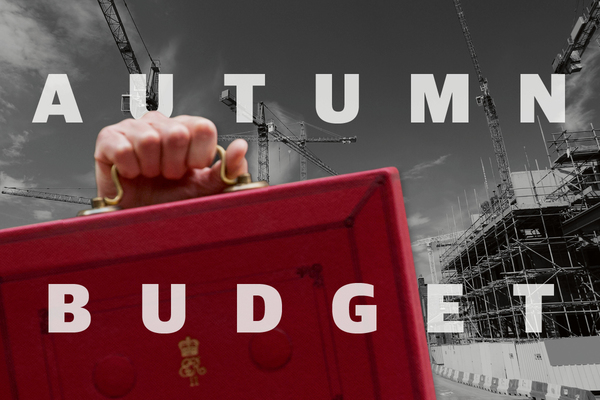You are viewing 1 of your 1 free articles
 David Cowans
David CowansFour innovative ways to boost housebuilding that were missing from the Budget
Green belt grading? Involving more people in planning decisions? David Cowans outlines some fresh ideas for ministers
We all know that we have to boost housing supply, so the government’s £44bn package of measures to deliver 300,000 more homes a year is a step in the right direction.
But as stated by the chancellor, there’s no one single solution to the housing crisis, so we need to look at more than just the numbers.
The burning question is how we are going to deliver these homes quickly and to a high quality. We also need to consider that to be sustainable, any new housing must be built alongside facilities that local communities want and need.
This will require more innovative thinking and a desire to do things differently, so here are four suggestions for the government to help the UK build more:
1. Green belt grading
Preserving our green belt is vital, but it’s not all idyllic British landscape. In London for example, research by London First showed that just 22% of the green belt consists of land which is environmentally protected or has public access.
If the government is serious about reaching its housebuilding targets, it must be more forensic when considering the green belt for development.
“Local authorities should be responsible for reviewing and grading the green belt.”
It’s not a case of whether we use all or none of it, but using our common sense to find appropriate space for housing within our towns and cities.
To achieve this, we need a green belt grading system.
Local authorities should be responsible for reviewing and grading the green belt, releasing low quality land for development.
This could include land which is spilling over from existing developments, located around the edge of towns or in scrapyards.
2. Stamp duty holiday for self and custom build
Not only do we need to increase housing supply, but the types of homes available.
We have a chronic shortage of good quality housing for older people to buy and rent, so more retirement properties are essential.
Building homes for older people so they can downsize will also free up existing housing stock for young people and families.
Self and custom build is another area we need to focus on.
Although it currently makes up a small percentage of the market, it could play a vital role in increasing supply alongside the volume house builders, providing people with more choice, creating more movement in the market and freeing up existing stock.
Recognising this, we’re currently running our own custom-build pilot schemes and embracing technology to help deliver these types of properties quickly and more effectively.
But the government needs to act too.
“We’re currently running our own custom-build pilot schemes and embracing technology to help deliver these types of properties quickly.”
The challenge at the moment is to make custom and self-build more mainstream and encourage potential homebuyers to consider it as a viable option.
Offering stamp duty holidays for self and custom build could provide the answer, giving this small but valuable market the impetus it needs to grow.
3. Putting infrastructure first
The government needs to prioritise investment in housing as infrastructure – a message we have been promoting for many years.
Major projects like HS2 will only deliver economic gains if they are supported by housing around the new transport interchanges created. Housing must therefore be seen as a fundamental requirement for our country that is prioritised alongside energy, transport and water.
The government should put equity into large-scale schemes and places with a focus on putting in the infrastructure before housing.
“Major projects like HS2 will only deliver economic gains if they are supported by housing.”
This will also give more weight to the long-term requirements of a local area and put the needs of communities at the forefront of construction.
Infrastructure can then unlock the different phases of housing construction, so it is delivered in a timely and sustainable manner.
4. Make planning truly democratic
It shouldn’t be the case that the only voices the planning system hears are from existing residents.
The voices of those who are priced out and desperately need new homes are rarely heard or drowned out by those who already live in a locality.
“We need a more democratic system which all local people can get involved in.”
We need a more democratic system which all local people can get involved in. From people paying for a plot of land to those on a council house waiting list, everyone should be given a stake in a new place and a voice in the discussion.
This could be helped by local authorities allocating affordable housing plots on new scheme to those on the waiting list before the planning process starts. Or perhaps developers could sell rights on their plots at a very low cost to prospective residents and then help them access finance.
National government, local authorities and developers must work together to address this issue and develop new ideas to shake up the system and give hope back to those who are currently ignored.
I’m not saying these proposals provide all the answers but they do emphasise the need for more suggestions and collaboration to help us find innovative solutions focused on housing delivery rather than numbers.
These ideas may not result in a magic solution, but they will help to develop more effective ways for the UK to hit its housebuilding target.
David Cowans, chief executive, Places for People
KEY BUDGET MEASURES AT-A-GLANCE
- Investment of £44bn in housebuilding in capital funding, loans and guarantees over the next five years to boost supply of skills, resources and land
- Commitment to be building 300,000 homes a year by mid-2020s
- £1.5bn package of changes to Universal Credit announced. This includes the scrapping of the seven-day waiting period at the beginning of a claim, making a full month’s advance available within five days of a claim for those that need it and allowing claimants on housing benefit to continue claiming for two weeks
- Lift council borrowing caps in "high-demand areas"
- A £125m increase over two years in Targeted Affordability Funding for Local Housing Allowance claimants in the private sector struggling to pay their rent
- New money into Home Builders Fund
- Extra £2.7bn for Housing Infrastructure Fund
- Invest £400m in estate regeneration
- £1.1bn on unlocking strategic sites
- Stamp duty for first time buyers on properties worth up to £300k will be axed, while the first £300k on properties worth up to £500k will also be scrapped
- Three new Housing First pilots announced for West Midlands, Manchester and Liverpool
- Councils to be given the power to charge 100% council tax premium on empty properties
- Government will launch a consultation to barriers to longer tenancies in the private rented sector
- £38m for Kensington & Chelsea Council for mental health and counselling services, regeneration projects in areas surrounding Grenfell Tower and a new community space
- Invest in five new garden towns
- £125m increase in Targeted Affordability Funding for Local Housing Allowance claimants in the private sector struggling to pay rent












